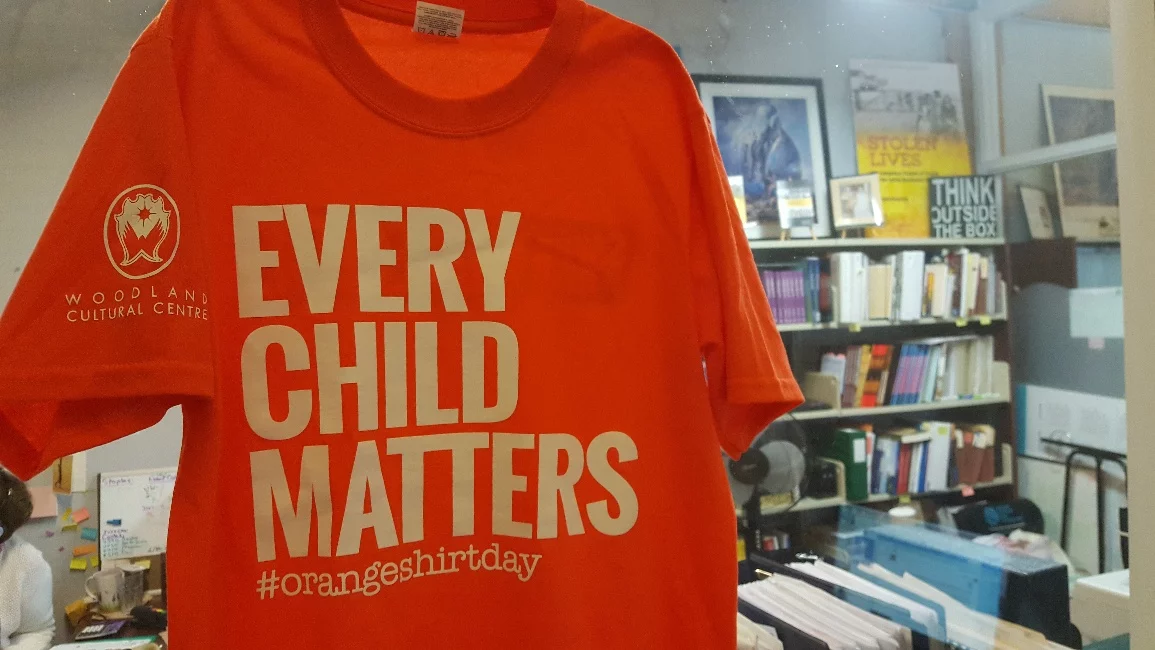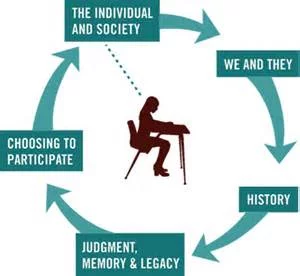some words before the video
As your school commemorates Orange Shirt Day this year, we hope these 5 resources and teaching ideas will equip you to teach your students (and colleagues) about Canada's Residential Schools, and inspire and empower students to create a meaningful response.
Read More
Topics:
Choosing to Participate,
Teaching Resources,
Truth and Reconciliation,
classroom lesson,
Indigenous,
Lesson Ideas,
stolen lives,
Orange Shirt Day,
cross curricular teaching and learning
This spring, Facing History and Ourselves, in partnership with the Azrieli Foundation Holocaust Survivors Memoir Program, invited 175 students from 6 schools to layer onto their learning about the history and legacies of the Holocaust, or of Canada's Residential Schools by reading Survivor memoir. Students read Theodore Fontaine’s Memoir Broken Circle: The Dark Legacy of Indian Residential Schools, or excerpts of Nate Leipciger’s Memoir The Weight of Freedom, then created pieces that reflected their understanding and responses to these testimonies, which were gifted to each Survivor.
Read More
Topics:
Toronto,
Holocaust,
Memoir,
Facing History and Ourselves,
Survivor Testimony,
Canada,
Residential Schools,
Canadian History,
Student Work,
project,
genocide,
Holocaust and Human Behaviour,
reflection,
Connected Learning,
Grade 10 History,
HSB,
CHC,
difficult conversations,
trc,
stolen lives,
facing history pedagogy,
Azrieli Foundation Memoirs,
Decolonizing Schools,
Holocaust History in Canada,
Facing Canada,
cross curricular teaching and learning,
collaborative inquiry
A Mindful Classroom: Establishing A Safe Space for Sensitive Topics
Many of us have seen the importance of mindfulness in our classrooms and personal lives. Being present and aware are integral to truly absorbing what is around you. How mindful are we of exactly what is around us in the classroom? The physical space we build for our students is often an afterthought to efficiency and more intangible metrics of behaviour and dynamics. This year, I made it my goal to be mindful of the materials within my classroom and how well they represent the values I hope we exercise within these walls.
Read More
Topics:
Art,
Student Work,
Indigenous History,
Social and Emotional Learning,
Middle School,
Culturally Responsive and Relevant Pedagogy,
facing history pedagogy,
Treaty,
Facing Canada,
cross curricular teaching and learning
Ever since attending my first Facing History and Ourselves workshop, I have looked for ways to incorporate Facing History pedagogy into my middle-years classroom. This year, I used the scope and sequence and pedagogical triangle to design the structure of my Grade 8 English Language Arts course.
Read More
Topics:
Strategies,
Book,
English,
stolen lives,
Reading List,
Decolonizing Schools,
Facing Canada,
cross curricular teaching and learning
Why Cross Curricular?
We know that time with students is limited, so taking advantage of repeated themes which exist between courses to help build bridges between knowledge gaps is an effective strategy. We also know that in the hecticness of a regular school day, these great concepts are often just that- concepts- because we don’t have time to take on anything more between teaching, marking, meetings, that varsity game you promised to attend, and the play you are helping find props for. Here are a few ideas with ready-to-use resources so that, if one speaks to you, you can easily use it within your classroom sooner rather than later. Remember, trying out one of these ideas on your own first and then looking to next year to work collaboratively can be a starting point, if finding an interested colleague to collaborate with proves difficult.
Read More
Topics:
Culturally Responsive and Relevant Pedagogy,
facing history pedagogy,
Treaty,
Facing Canada,
cross curricular teaching and learning


.jpeg)
